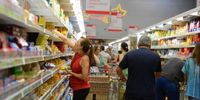The inflation measured by the IPCA, the National Consumer Price Index, receded to 0.43% in April 2025, after registering 0.56% in March. This rate marks the highest for the month since 2023, when it was recorded at 0.61%. The data, released on Friday by the IBGE, reveal that while the Food and Beverages group slowed from 1.17% to 0.82% from March to April, it still had the most significant impact on the index. Additionally, the Health and Personal Care group contributed, with price increases rising from 0.06% to 0.16% during the same period.
Fernando Gonçalves, the manager of the research, explained that the food group carries the most weight in the IPCA, which is why it exerts a significant impact even as it slows down. He also noted that the increase in Health and Personal Care was influenced by the prices of medicines. The main price increases in the food group were seen in potatoes, tomatoes, and ground coffee, while there were also some decreases, such as in carrots, rice, and fruits.
In the Health and Personal Care category, the variation was primarily driven by pharmaceutical products due to a readjustment of up to 5.09% authorized for medicines starting on March 31, 2025. Six other surveyed groups also recorded positive rates, with Transportation being the only group to show a decrease, benefiting from lower fuel prices and airfare costs.
With the results from April, the accumulated inflation over the last 12 months reached 5.53%, while the year-to-date figure stands at 2.48%. The IPCA reflects the average cost of living for families earning between 1 and 40 minimum salaries. The IBGE also released data for families earning up to five minimum wages, showing that the INPC, the National Consumer Price Index, rose by 0.48% in April. Year-to-date, the accumulated inflation is 2.49%, and over the last 12 months, it is at 5.32%, surpassing the 5.20% observed in the previous 12 months.
In April, the Food and Beverages group contributed 0.18 percentage points to the index, while Health and Personal Care accounted for 0.16 percentage points. The Transportation group, on the other hand, negatively impacted the index by -0.08 percentage points due to a drop in prices, particularly in airfares and fuels.
The Food and Beverages group decelerated from 1.17% in March to 0.82% in April. Food at home saw an increase of 0.83%, while food outside the home rose by 0.80%. Significant contributors to this rise included potatoes (18.29%), tomatoes (14.32%), ground coffee (4.48%), and snacks (1.38%). Conversely, rice experienced a notable decline of -4.19%.
In the Health and Personal Care category, the overall increase of 1.18% was influenced by pharmaceutical products, which rose by 2.32%, contributing 0.08 percentage points to the overall index. The Transportation group, which fell by -0.38%, was primarily affected by a significant drop in airfare prices (-14.15%) and fuel costs (-0.45%). All fuel types reported negative variations in April: diesel oil fell by -1.27%, vehicular gas by -0.91%, ethanol by -0.82%, and gasoline by -0.35%.
Furthermore, the Clothing group recorded an increase of 1.02%, with notable rises in women's clothing (1.45%), men's clothing (1.21%), and footwear and accessories (0.60%). Gonçalves attributed this to seasonal changes and the introduction of new collections. In the Personal Expenses group, increases were observed in cigarettes (2.71%) and banking services (0.87%).
The Housing group saw a deceleration from 0.24% in March to 0.14% in April, with residential electricity prices declining by 0.08% due to reductions in PIS/Cofins in specific areas.
The special aggregate of services reflected a deceleration from 0.62% in March to 0.20% in April, while monitored prices accelerated from 0.18% to 0.35%.
Regionally, the highest variation of 0.95% was recorded in Porto Alegre, attributed to increases in residential electricity (3.37%) and tomatoes (45.96%). The lowest variation was noted in Brasília at 0.04%, due to decreases in airfare (-7.46%) and gasoline (-1.69%).
In summary, the IPCA inflation rate for April 2025 reflects a complex interplay of various factors affecting consumer prices across different categories. The data emphasizes the ongoing challenges within the economy, particularly concerning food prices and healthcare costs, while also highlighting areas where consumers are benefiting from lower transportation costs.





